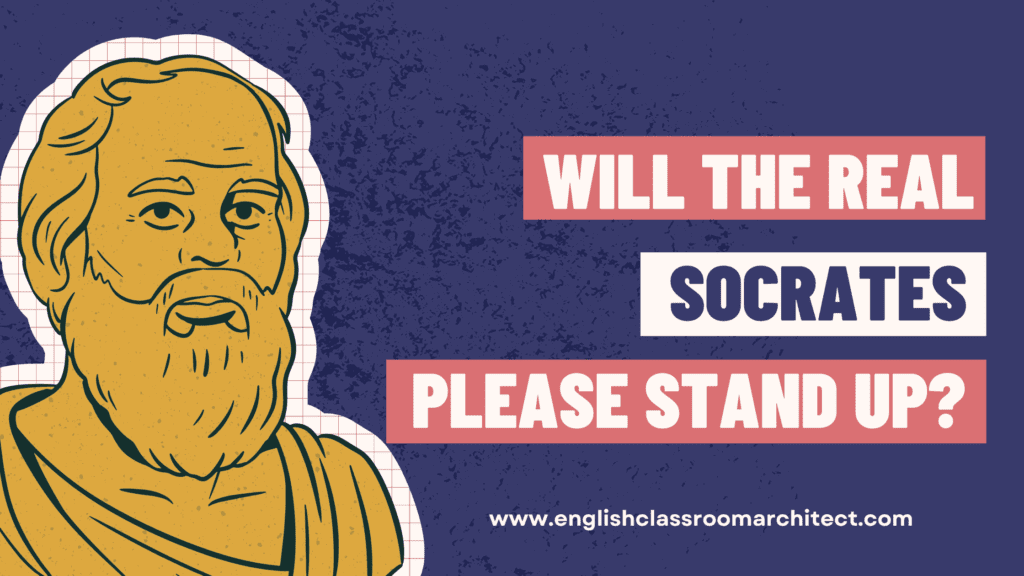Will the real Socratic Seminar please stand up?
As I’ve been revamping my English 10 Honors curriculum, I’ve found myself reflecting deeply on various teaching methods, particularly Socratic seminars. While these discussions are a staple in many English classrooms, I’ve begun to wonder: how close are we really staying to Socrates’ original intent? And more importantly, how can we bridge the gap between our current practices and the true spirit of Socratic inquiry?

Table of Contents
Understanding Socrates’ Method
Before we dive into practical applications, let’s review what sets Socrates’ approach apart. Key elements often missing in modern seminars include:
- Aporia: The state of purposeful confusion that Socrates induced in his interlocutors.
- Elenchus: Socrates’ method of cross-examination to expose contradictions in beliefs.
- Challenging assumptions: The constant questioning of even the most basic premises.
These elements create a form of inquiry that’s far more probing and unsettling than many of our current seminar practices.

Practical Ways to Make Seminars More Socratic
Emphasizing Process Over Outcomes
In my classroom, I’ve been experimenting with valuing the journey of inquiry over reaching predetermined conclusions. For example, when discussing complex texts like Macbeth or Frankenstein, I encourage students to explore contradictions and ambiguities rather than rushing to interpret.
Increasing Spontaneity and Organic Development
While structure is important, I’ve found that allowing discussions to evolve organically often leads to more profound insights. During our upcoming storytelling unit, which includes an analysis of Beyoncé’s concept album, I plan to let student interests guide our exploration, much as Socrates followed the natural flow of conversation.
Encouraging Deeper, More Philosophical Questioning
Training students in Socratic questioning techniques has been transformative. For our Progress and Ethical Dilemma Research Project, students will practice formulating questions that challenge fundamental assumptions about progress and ethics.
Ready to take your questioning techniques to the next level? Check out our detailed guide on the SPICE-DR method, a framework designed to bring the true spirit of Socratic questioning into your classroom. [Insert link to SPICE-DR post here]
Incorporating “Socratic Irony”
Positioning myself as a co-learner rather than an authority figure has opened up new dimensions in our discussions. When exploring unreliable narrators in The Prestige or The Sixth Sense, I plan to use Socratic irony to prompt deeper thinking about truth and perception.
Embracing Discomfort and Confusion
Creating a classroom culture that values intellectual struggle is essential. Our study of challenging texts like Macbeth provides ample opportunity to help students find productivity in moments of uncertainty.

Overcoming Challenges
Implementing a more rigorous Socratic approach isn’t without its challenges. Time constraints are real, and there’s always pressure to cover required material. I’ve found that integrating Socratic methods across various units, rather than treating them as separate activities, helps address these concerns.
The Impact of More Authentic Socratic Seminars
By embracing a truly Socratic approach, we can foster critical thinking, metacognition, and intellectual humility in our students. These skills are crucial not just for literary analysis, but for navigating the complexities of the real world.
Getting Started with Socratic Seminars: First Steps for Teachers
If you’re intrigued by this approach, here are some simple techniques to introduce in your next class discussion:
- Channel your inner two-year-old and ask more “why” follow-up questions.
- Introduce the concept of aporia and celebrate moments of confusion.
- Model intellectual humility by admitting when you’re unsure about something.

Conclusion
As English teachers, we have a unique opportunity to cultivate deep, critical thinking through our discussions of literature. By returning to the roots of Socratic philosophy, we can transform our seminars from simple Q&A sessions into profound explorations of ideas, preparing our students not just for tests, but for a lifetime of thoughtful inquiry.
What are your experiences with Socratic seminars? How do you balance structure and spontaneity in your discussions? I’d love to hear your thoughts and strategies in the comments below!
